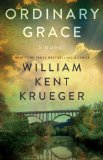Summary | Excerpt | Reviews | Beyond the Book | Readalikes | Genres & Themes | Author Bio

Prologue
All the dying that summer began with the death of a child, a boy
with golden hair and thick glasses, killed on the railroad tracks
outside New Bremen, Minnesota, sliced into pieces by a thousand
tons of steel speeding across the prairie toward South Dakota. His
name was Bobby Cole. He was a sweet-looking kid and by that I mean
he had eyes that seemed full of dreaming and he wore a half smile as if
he was just about to understand something you'd spent an hour trying to
explain. I should have known him better, been a better friend. He lived
not far from my house and we were the same age. But he was two years
behind me in school and might have been held back even more except
for the kindness of certain teachers. He was a small kid, a simple child,
no match at all for the diesel-fed drive of a Union Pacific locomotive.
It was a summer in which death, in visitation, assumed many forms.
Accident. Nature. Suicide. Murder. You might think I remember that
summer as tragic and I do but not completely so. My father used to
quote the Greek playwright Aeschylus. "He who learns must suffer.
And even in our sleep pain, which cannot forget, falls drop by drop
upon the heart, until, in our own despair, against our will, comes wisdom
through the awful grace of God."
In the end maybe that's what the summer was about. I was no
older than Bobby and didn't understand such things then. I've come
four decades since but I'm not sure that even now I fully understand.
I still spend a lot of time thinking about the events of that summer.
About the terrible price of wisdom. The awful grace of God.
1
Moonlight pooled on the bedroom floor. Outside the chirr of
crickets and other night bugs gave life to the dark. It was
not yet July but already hot as blazes. That may have been
why I was awake. In 1961 no one but the rich in New Bremen had airconditioning.
During the day most folks battled the heat by closing
their curtains against the sun and at night fans drew in the promise of
cooler air. In our house there were only two fans and neither was in the
bedroom I shared with my brother.
As I tossed about on top of the sheet trying to get comfortable in
the heat the telephone rang. My father often said that nothing good
came of phone calls in the middle of the night. He answered them
anyway. I figured it was simply another part of his job, another part of
all the things my mother hated about what he did. The telephone sat
on a small table in the hallway outside my room. I stared at the ceiling
and listened to the brittle ring until the hall light came on.
"Yes?"
Across the room Jake shifted in his bed and I heard the frame
squeak.
My father said, "Any damage?" Then he said, tired and polite, "I'll
be there in a few minutes. Thank you, Cleve."
I was out of bed and trotting into the hallway before he hung up.
His hair was wild from sleep, his cheeks shadowed blue with stubble.
His eyes were weary and sad. He wore a T-shirt and striped boxer
shorts.
"Go back to sleep, Frank," he told me.
"I can't," I said. "It's too hot and I'm already awake. Who was it?"
"A police officer."
"Is somebody hurt?"
"No." He closed his eyes and put the tips of his fingers against his
lids and rubbed. "It's Gus."
"He's drunk?"
He nodded and yawned.
"In jail?"
"Go back to bed."
"Can I go with you?"
Excerpted from Ordinary Grace by William Kent Krueger. Copyright © 2013 by William Kent Krueger. Excerpted by permission of Atria Books. All rights reserved. No part of this excerpt may be reproduced or reprinted without permission in writing from the publisher.




A library is a temple unabridged with priceless treasure...
Click Here to find out who said this, as well as discovering other famous literary quotes!
Your guide toexceptional books
BookBrowse seeks out and recommends the best in contemporary fiction and nonfiction—books that not only engage and entertain but also deepen our understanding of ourselves and the world around us.